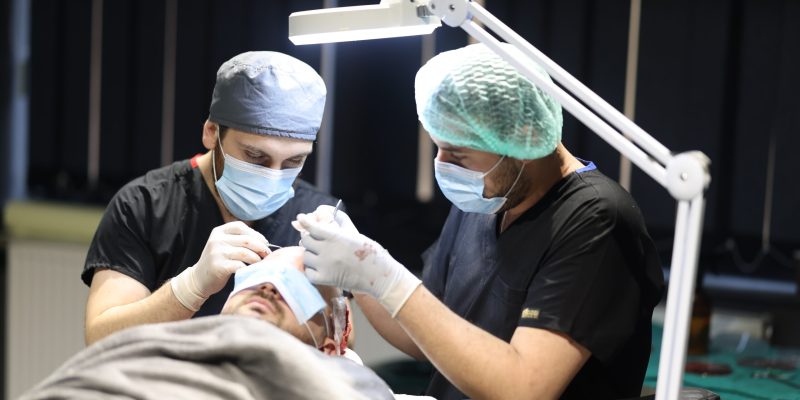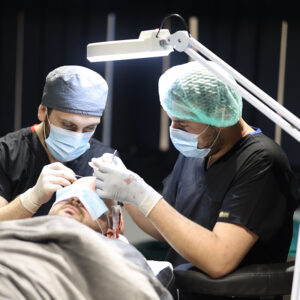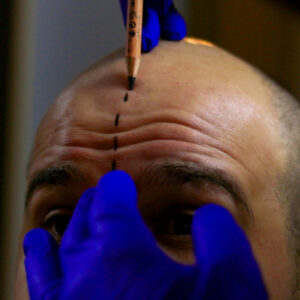Who Is Eligible for Hair Transplantation?

Details
READING TIME
3 min
CATEGORY
News
AUTHOR
Milly Smith
TOPIC
Promotions
Who Is Eligible for Hair Transplantation?
Hair loss can affect both men and women, often leading to a loss of confidence and self-esteem. For those seeking a permanent solution, hair transplantation has become one of the most effective treatments available. But is everyone a good candidate for this procedure? At Sapphire Med Hair & Beauty Clinic, we help patients determine if hair transplant surgery is right for them. In this post, we’ll explore the criteria for hair transplant eligibility to help you understand if you’re an ideal candidate.
What Is Hair Transplantation?
Before diving into the specifics of who is eligible, it’s important to understand what a hair transplant involves. Hair transplantation is a surgical procedure that involves extracting hair follicles from a donor area (usually the back or sides of the head) and implanting them into areas experiencing hair loss. Popular methods like FUE (Follicular Unit Extraction) and DHI (Direct Hair Implantation) are used to achieve natural-looking results.
Who Is a Good Candidate for Hair Transplantation?
While hair transplant surgery can be highly effective, not everyone is suited for the procedure. Several factors determine whether you’re a suitable candidate for a hair transplant.
1. Stable Hair Loss
One of the key factors in determining eligibility is the stability of your hair loss. Ideal candidates for hair transplantation have a well-established pattern of hair loss, which means the hair loss has been consistent for several years. Those with progressive hair loss may need to wait until their hair loss stabilizes to avoid the need for further surgeries down the line.
2. Sufficient Donor Hair
Hair transplants require a donor area, typically the back or sides of the scalp, where hair is still growing. Candidates must have enough healthy hair in these donor areas to ensure successful transplantation. If you have a high degree of baldness and a limited donor area, your results may not be as satisfying.
3. Age
There is no specific age limit for hair transplantation, but younger patients should be cautious. Hair loss can continue as you age, and performing a transplant too early may result in unnatural-looking hairlines or further loss in areas not treated. Patients over the age of 25 are generally better candidates, as their hair loss pattern is more established.
4. Hair Type
Your hair type can also influence the outcome of a hair transplant. Individuals with thick, coarse hair typically achieve better coverage compared to those with fine, thin hair. The natural curl or wave in the hair can also help create the appearance of more density after transplantation.
5. Good General Health
Since hair transplantation is a surgical procedure, candidates must be in good general health. Chronic conditions like diabetes or autoimmune diseases may affect the healing process and the success of the surgery. A thorough medical evaluation will be conducted to ensure you’re fit for the procedure.
6. Realistic Expectations
Hair transplantation can significantly improve hair density and coverage, but it’s important to have realistic expectations. The goal is to enhance your appearance, not to completely restore a full head of hair. Understanding the limitations and potential outcomes of the procedure will help you make an informed decision.
Who May Not Be Suitable for Hair Transplantation?
Not everyone is an ideal candidate for hair transplantation. Some individuals may not benefit from the procedure, including:
- People with Diffuse Hair Loss: Those with widespread thinning across the scalp, rather than concentrated in one area, may not have enough viable donor hair for transplantation.
- Individuals with Active Hair Loss: If your hair loss is still progressing rapidly, it’s best to wait until it stabilizes before considering a transplant.
- Patients with Certain Medical Conditions: Some medical conditions, such as alopecia areata or scarring alopecia, may make hair transplantation ineffective.
Alternative Solutions for Hair Loss
If you’re not a suitable candidate for hair transplantation, don’t worry—there are still effective alternatives to explore. Non-surgical treatments like PRP (Platelet-Rich Plasma) therapy, medications, and low-level laser therapy can help slow down hair loss and stimulate hair regrowth. These treatments can also complement a hair transplant procedure to maximize results.
Consultation: The First Step
The best way to determine if you are a candidate for hair transplantation is to schedule a consultation with an experienced specialist. At Sapphire Med Hair & Beauty Clinic, our team will assess your hair loss, evaluate your medical history, and discuss your goals to create a personalized treatment plan. We’re dedicated to helping you find the best solution for your hair loss concerns.
Conclusion
Hair transplantation is a highly effective solution for individuals with stable hair loss, sufficient donor hair, and realistic expectations. However, not everyone is a candidate for the procedure. A professional consultation can help you understand your options and guide you toward the right treatment for your unique needs. If you’re considering a hair transplant, contact Sapphire Med Hair & Beauty Clinic today to begin your journey toward restored confidence and a fuller head of hair.








